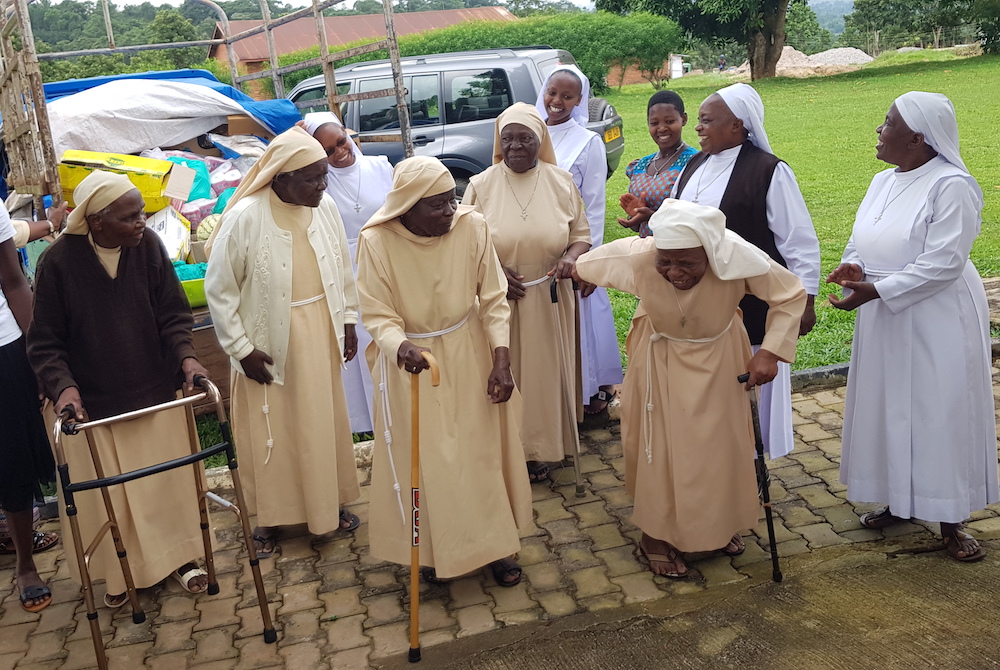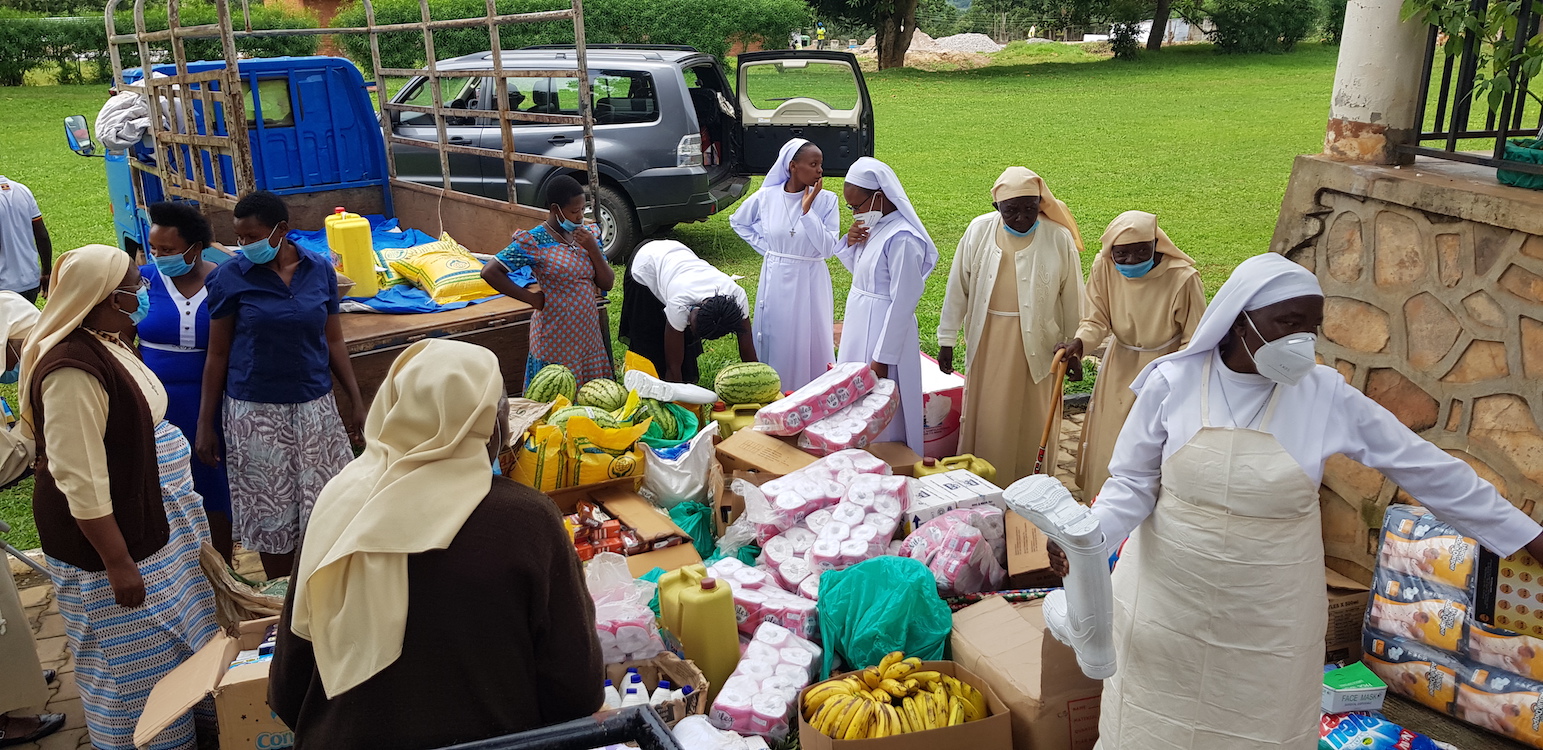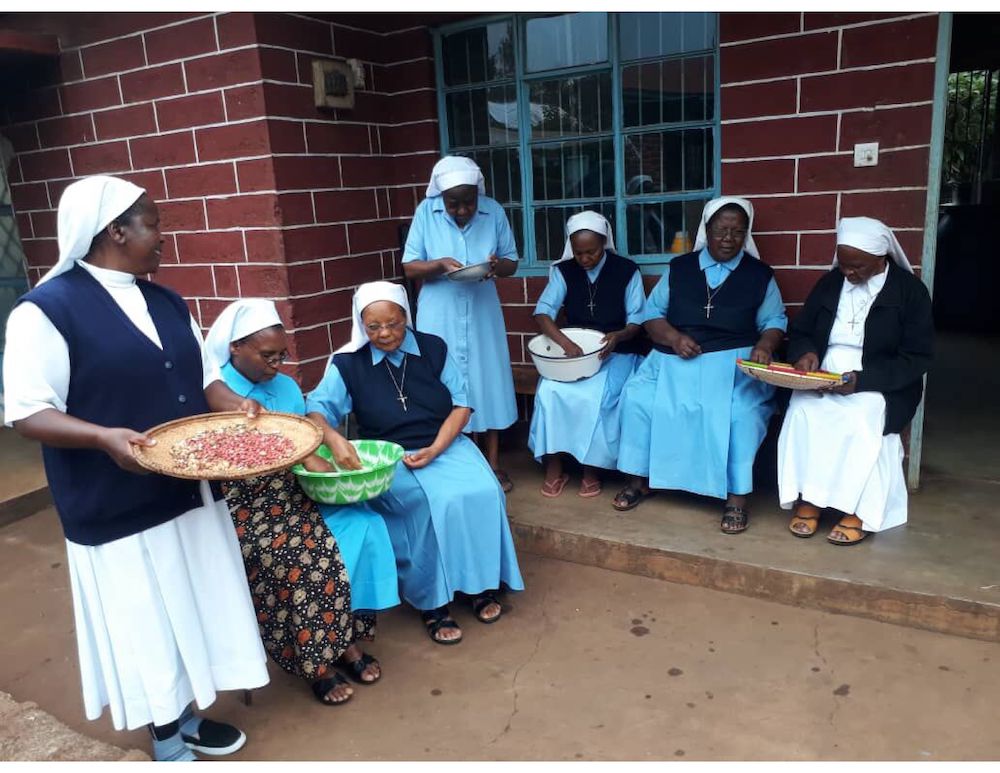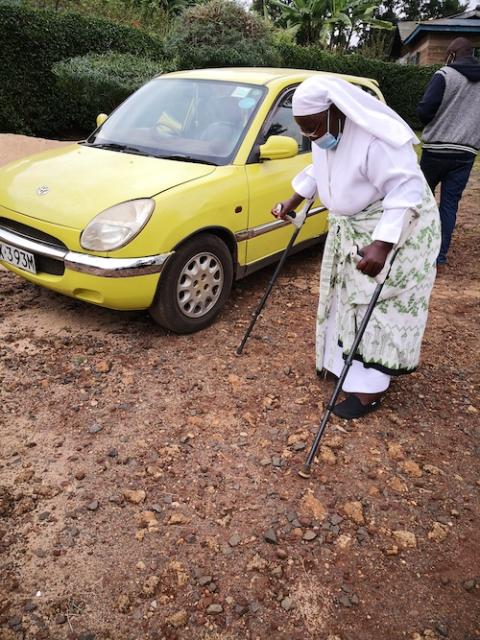
Sister Mary Paula, one of the elderly community members of the Little Sisters of St. Francis in Nkokonjeru in Jinja, Uganda, expresses her joy in song and dance. The Conrad N. Hilton Foundation provided he six-month COVID-19 emergency project to assist 61 religious congregations through the Association of Consecrated Women in Eastern and Central Africa. (Courtesy of Little Sisters of St. Francis)
A year ago in March 2020, Sr. Hellen Bandiho, secretary general of the Association of Consecrated Women in Eastern and Central Africa (ACWECA), noted: "Hearing what was happening in Europe and elsewhere about the impact of COVID-19 on older adults and those with pre-preconditions was alarming."
She was worried because she was aware that most of the locally founded congregations in the region, which includes Eritrea, Ethiopia, Kenya, Malawi, South Sudan, Sudan, Tanzania, Uganda, Zambia and Zimbabwe, had few financial resources to care for elders with preexisting conditions, which made them more vulnerable to COVID-19. It was causing panic in many religious congregations, and was coupled with fear about the ill-equipped health systems of African nations. How would they be able to adequately ensure the safety of their sisters?
Fortunately, ACWECA — with a grant from the Conrad N. Hilton Foundation — was able to implement a six-month COVID-19 emergency project to assist 61 religious congregations with elderly and sick sisters in care homes. (The Hilton foundation is a major funder of Global Sisters Report.)
"Since we could not reach all the 300-plus congregations in the region, our first priority was congregations with elderly and sick care homes," Bandiho said.

Items donated by the Conrad N. Hilton Foundation through the Association of Consecrated Women in Eastern and Central Africa (ACWECA) to help fight COVID- 19 challenges arrive at the care home of the Little Sisters of St. Francis in Nkokonjeru in Jinja, Uganda. (Courtesy of Little Sisters of St. Francis in Nkokonjeru)
A second criteria was the number of sisters in those homes. This would determine the amount of the grants, ranging from $1,000 to $5,000. They included congregations in ACWECA's 10 member countries.
Bandiho added, "The grants may seem small, but even the ones who received $1,000 were equally very grateful."
Bandiho acknowledged that though she and her team followed the criteria, "For some congregations, it was the general economic situations of their countries coupled with the situation of the sisters which moved us to support the sisters." She cited Sudan, where not all 10 congregations serving there had care homes, but benefited after the leadership of the Sudan national association requested help from her office. In South Sudan, ACWECA reached into remote areas where two small groups, one with four sisters and the other with two — Sisters of Our Lady of Peace in Tombura-Yambio and the Nazareth Sisters of Wau, both founded in the 1950s — had extremely limited finances and desperately needed help.
In April 2020, the ACWECA Secretary General wrote a letter to the national conferences in the region, noting with concern the growing numbers of infections on the continent. She warned that the pandemic was real and encouraged the sisters to respond wisely. The challenge spurred many congregations to join their governments' efforts to combat the pandemic on the continent.
When Kenya confirmed its first case of coronavirus in March 2020, Sr. Jane Wairimu's first instinct was to secure the safety of their elderly and sick sisters, members of the Sisters of Mary Immaculate of Nyeri, at Our Lady of Lourdes Mwea infirmary. "The first thing I did was to put a notice at the entrance that visitors are not allowed into the facility," Wairimu recalled, adding that she was following the Ministry of Health guidelines in limiting external interaction with those in the facility. She proposed telephone interaction instead. Wairimu's next action was to ensure sisters' access to nutritious meals so as to boost their immunity. "We included a lot of proteins, fruits, fresh vegetables and milk in the diet of the care home, she said. She noted "The [Hilton] grant enabled us to provide a balanced diet, improve cleanness within the infirmary as well as pay salary for specialized medical care for the elderly and sick sisters."

Some of the elderly and sick Sisters of the Missionary Congregation of the Evangelizing Sisters of Mary keep busy at their care home in Kilacha in Moshi, Tanzania. (Courtesy of Sisters of the Missionary Congregation of the Evangelizing Sisters of Mary)
Sr. Lucy Nderi who was in charge of implementing the project at their Kenya-based Institute of the Blessed Virgin Mary (IBVM Loreto Sisters) recalls that personal protective equipment (PPEs) were in short supply. "When coronavirus was confirmed in Kenya, it was not easy for us to get the PPEs because every Kenyan was very aggressive when it came to securing those protective gears. … The help we received from the Hilton Foundation came at a time we least expected, not only for our elderly and sick members but also for those working at the facility."
The Missionary Congregation of the Evangelizing Sisters of Mary in Tanzania similarly explained how they spent their grant. "Medication has taken over 73% of the money received because the national health insurance does not provide all the needed medicines for our care home," Sr. Agnes Mugaya explained in her final report to ACWECA. Other items that required higher expenditures included protective gear and cleaning detergents (12.27%), car usage (slightly over 10%) and a combination of food and salary (3.27 %).
In Uganda, where the government took proactive measures — beginning with lockdowns — the Sisters of Our Lady of Good Counsel still left nothing to chance. They made sure that 68 elderly and sick sisters spread out to 29 communities (with 42 of them residing in three care homes), were well taken care of. "It would have been very good to have them all together, but for want of enough space, it has not happened," Superior General Sr. Romina Nyemera explained.
Sisters of Mary Immaculate of Nyeri enjoy a meal together at their Care Home at Our Lady of Lourdes in Mwea, Kenya. (Courtesy of Sisters of Mary Immaculate of Nyeri)
She and her council visited the 26 far-flung communities "to take their precious gifts of food stuffs and medicines from Hilton-ACWECA fund. … The joy of the elderly sisters was indescribable." Nyemera told of one elder's gratitude: "You truly appreciate what we did when we were still strong! So we are still treasured; I feel so loved in my Institute." It had never occurred to Nyemera that such a gesture would mean so much to their elderly members. "It helped me as a superior general to understand that such a gesture was essential for all people, especially those who are retired and have the feeling that they are not remembered. It inspired me deeply."
Advertisement
The Dominican Sisters' House of Adoration in Zimbabwe — where 20 elderly and sick live, ranging in ages from 74 to 105 — greatly appreciated the gift their congregation received in support of their care home. "Your donation came just at a time where we are facing lots of economic hardships in our country. Our currency is very unstable and many goods, especially medical supplies have to be purchased in U.S. dollars," noted Sr. Rosemary Lemmermeir, superior of the care home. Striving to be true to their name, the sisters have daily eucharistic adoration after morning Mass till lunch time, she said. "But since the start of the coronavirus, we also started to have eucharistic expositions in the afternoons too, and we pray for all the people to be protected, while not forgetting our dear benefactors who support us."
Meanwhile, Queen of Peace Rest House of the Immaculate Heart of Mary Reparatrix Ggogonya in Entebbe, Uganda, home to 28 elderly and sick sisters, used over 70% of the money received from the emergency fund for medicines and other medical supplies. The congregation also hired two specialized medical doctors to take care of the sisters in the care home, besides their two sisters, trained medical personnel and three aid nurses.
According to Superior General Sr. Speranza Namusisi, most of the sisters here have serious health challenges that require around-the-clock support.

A member of the Nazareth Sisters of Wau, South Sudan, takes a walk at the Mother House in Nkabune, Kenya, where their Care Home for elderly and sick members currently is situated. (Courtesy of Nazareth Sisters of Wau)
"We did not reach everybody, but we are happy that we were able to support some congregations," Bandiho said. ACWECA financial administrator, Sr. Betty Grace Atim added: "The fact that Hilton Foundation thought of supporting our elderly sisters in the region at this time of the pandemic, means so much to us."
Now the pandemic is moving across the globe in second and even third waves, including in African countries. But Sr. Betty Grace Atim noted that the sisters have learned much already in this COVID-19 crisis; she said it was a wake-up call, for the sisters were not prepared for such an emergency. "It is difficult to be firefighters. We need to plan and save so as to avoid future emergencies."
Congregations need to rise to the challenge of training members on how to care for their elderly and sick members as a priority issue. Wairimu, of the Sisters of Mary Immaculate of Nyeri, said that caring for their elderly and sick sisters — especially during this time of the pandemic — is like giving back what they gave us as an institute. "We are here because of them," she says, adding that the institute now cares for them because they are unable to take care of themselves.





